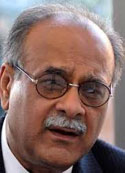
By Najam Sethi
30 Jan 2015
General (retd) Pervez Musharraf is endearingly candid. In a series of interviews since he relinquished office, he has revealed many nuggets of information and analysis. For instance, at the height of the anti-drone sentiment in the public in 2013 when the government was pretending to be opposed to the drones and the Foreign Office was churning out protests, he calmly admitted that he had secretly given permission to the CIA to use drones in the war against terrorism. He has also rued the NRO deal with Benazir Bhutto because it became a bone of contention with the judiciary and destabilized Pakistan. He laid part responsibility on the Chaudhrys of Gujrat who advised him to concede the NRO but retain the constitutional restriction on anyone becoming prime minister for a third time (doubtless because it suited their political careers).
Now, in a refreshing analysis, he criticizes his handpicked successor as army chief, General Ashfaq Kayani, for not going after the Taliban in Waziristan and contrasts General Kayani’s reticence, which has damaged Pakistan, with the bold and decisive manner in which his successor, General Raheel Sharif, has acted. “You see, the main issue is that when a government is inactive, it requires an army chief to go and coax it into action. That’s what [Gen] Raheel has done. So either Gen Kayani was scared or too reticent or too reserved. He didn’t want to go and discuss this matter.”
He contrasted General Kayani’s attitude with his own while he was still giving the orders: “We acted against Fazlullah and defeated him. Peaceful elections were held in 2008. The turnout was good. The Awami National Party — and not religious parties — came to power in Khyber Pakhtunkhwa. And then Fazlullah was allowed to return and set on fire 13 girls schools. He had the tourist resort in Malam Jabba torched. No action was taken till he crossed the Shangla Hills and almost blocked the Karakoram Highway. When there was international hue and cry that the militants were only 100 miles away from Islamabad, then they woke up… The army was clear in its views as a whole. They wanted action, even in Kayani’s days. Kayani has to be asked why he did not act [against the terrorists].”
That, of course, is the central question. It becomes all the more necessary to get an answer because General Kayani clearly recognized the danger from the Taliban whom he described in a significant speech to passing out cadets as “an existential threat” to the country. In fact, Gen Kayani went so far as to argue that the internal threat of “Islamic” terrorism was far more potent than the external threat (of India), a statement that some viewed as signalling a “paradigm change” in the central strategic vision of the military. Indeed, there was a time when he was on the verge of launching operations against the TTP but pulled back at the last minute after senior American officials let it be known publicly that they had met him and urged him to take military action. It was speculated that he began to drag his feet because he didn’t want to be seen as doing “America’s bidding” in an extremely anti-American environment in Pakistan. In consequence, General Kayani’s inaction for six years enabled the TTP to grow strong and exact thousands of civilian and military casualties, a terrible harvest we are reaping today. This “inaction” also alienated General Kayani from Pakistanis and Americans alike.
General Musharraf has insightful advice to give those who, like the MQM, are clamouring for martial law as the solution to Pakistan’s problems of terrorism. “I don’t think there should be martial law… Pakistan is facing the worst situation in its history. The economy is not doing well. Terrorism is in all the provinces. It has never been this bad. The army is a fall back force in the country. We, in the military, call it a ‘force in being’. Its potential consists in being. If you use it or consume it, it’s gone. If you were to use the military, and suppose in the present situation of turmoil, they are unable to rectify the socio-economic ills of Pakistan, you’d have consumed this fall back force.”
Of course, Gen Musharraf didn’t take his own advice in 1999 when there was no national crisis in the country and he and his colleagues seized power only because their own military careers were on the line following their disastrous adventure in Kargil.
Meanwhile, the government of Nawaz Sharif would do well to heed Musharraf’s words regarding General Raheel Shareef’s decisive moves and action-oriented globetrotting. “It’s not he who’s doing that, it’s those countries who are giving him that stature. The army is the only stabilising institution in Pakistan. That is why they give importance to the military chief. Especially when they also see the degree of bad governance going on [by the civilians)… Look, international relations largely depend on personalities. Agar Aap Nay Ja Kay Kookro Ban Kay Baith Jana Hai, To Aap Ko Kya Importance Milay Gi”.
Source: http://www.thefridaytimes.com/tft/musharrafs-candour/#sthash.Uzk1x7Fo.dpuf




 Moderate Islamist here
Moderate Islamist here


0 comments:
Post a Comment